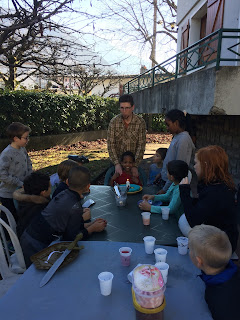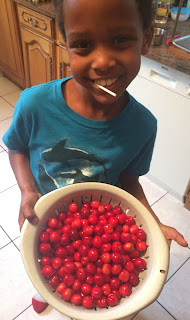Feel free to send me a message with any questions.
I'm struggling to add this patterns as a PDF to blogger. But I think if you pull the image into Pages or Word and then enlarge to fill an 8.5 x 11 page then print you'll get a template.
You can also look for a pattern and instructions on this blog, which is where I found the pattern and then we adapted it for more coverage, nose wire and open ends for adding another filter between the who layers. We made the outer layer of our pattern longer to cover the chin and longer towards the ears. But yesterday, when I clicked on the blog linked above, I saw that the author has made adaptions to her original mask pattern to meets the needs of masks for this pandemic.
Cut two of the outer layer pieces from fabric and place right sides together. Sew along the nose to chin.
Fold over and sew about an inch on the top and bottom on each side near the ear (pictured above) and then fold over and sew from top to bottom to make a pocket for the string or elastic to go through. (pictured below)
We decided to use T-shirt for this inner layer because studies showed that it was a good material for blocking particles and it is comfortable against the skin.
Cut two of the inner layer pattern and sew, nose to chin, right sides together. Fold and sew the inner mask, ear edge. This does not have to be a big fold over as it's just to keep the material from fraying, not for elastic or string to fit through.
Place right sides together at nose/chin seam and pin the layers together. The inner layer should not come all the way to the edge of the outer layer. Do not sew down the sides by the ear, we want to leave these open so that later another filter layer can be added if desired.
Sew along the top and bottom of the mask to attach the two layers.
Then sew another stitch along the top (nose) side of the mask. This is for wire.
Leave open at both ends. Later you could slide in a piece of vacuum bag or other material to be a good additional filter.
Flip the mask right side out.
You can slide strings or elastic into the outer layer ear side pockets. We used strings as we are cleaning the masks in the autoclave and the high temperatures would likely deteriorate elastic.
Bend the wire over onto itself a little so that it won't poke through the material, then slide the wire through the long pocket formed by the two lines of stitches along the nose side of the mask. After the wire was in place we added a little stitch in the material on either side of the wire to hold the wire from sliding out.
I was able to give the pattern and a few samples to some Burundian sewing ladies and they are now mass producing masks for hospital employees.























